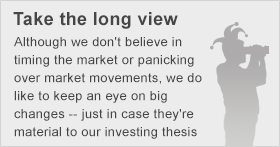
Following a flat week for U.S. stocks, the major U.S. indexes opened higher on Monday morning. The benchmark S&P 500 and the narrower Dow Jones Industrial Average (^DJI +0.14%) were up 0.6% and 0.7%, respectively, at 10:20 a.m. EDT. Earnings will again dominate this week, but the market will also closely watch two macro events: The Federal Reserve's April monetary policy meeting and the April employment report, which is to be released at 8:30 a.m. EDT Friday. In this morning's company-specific news, Pfizer (PFE +0.00%) openly declared its interest in AstraZeneca (AZN +0.86%) and Apple (AAPL +0.13%) is preparing a jumbo bond offering.

Five years from the worst of the Great Recession – and five years into a roaring bull market in stocks -- corporate executives seem finally to be getting their appetite back for mergers and acquisitions. According to data cited in the Financial Times, the value of global M&A year to date has reached roughly $1.2 trillion -- the highest level since the credit-fueled boom of 2007 ($1.4 trillion for January through April).
One area that was thought to be completely consolidated was the top end of the pharmaceuticals industry, but there could be room for at least one more megamerger, as Pfizer this morning confirmed its interest in U.K. drugmaker AstraZeneca (this follows Valeant Pharmaceuticals' $46 billion offer for Allergan last week).
In the statement, Pfizer said it first approached AstraZeneca with an offer in January. "Limited high level discussions" collapsed in mid-January, and Pfizer only went back to AstraZeneca on April 26, "in light of recent market developments" (read: Valeant/ Allergan -- shares of both the acquirer and the target were up last week). As a result of the announcement, shares of AstraZeneca were up 14.5% at 10:20 a.m. EDT, giving the company a market capitalization of roughly $100 billion.
Interestingly, the shares of Pfizer are also up 3.7% in reaction to the news. Pfizer summed up its rationale for the deal in this way:
Both AstraZeneca and Pfizer shareholders would be expected to participate in short, medium and long-term value creation through enhanced pipeline development opportunities, premier global operations and the anticipated realisation of operational and financial synergies
In other words, Pfizer buys a pipeline and can reduce costs as it combines the two operations. Of course, this was the same rationale pharma companies advanced to push consolidation of the industry; however, that process seemed to have found its natural limits in just such behemoths as Pfizer, which has struggled to replace revenues from blockbuster drugs that go off-patent. This morning, however, the market wants to believe in the idea once more.
Another big bite for Apple
One year on from a $17 billion bond offering that was then the largest in corporate history (it has since been topped by Verizon), Apple is preparing another $17 billion bond sale to fund the increase in its share repurchase program it announced during last week's earnings report.
Apple is already swimming in cash, but nearly nine-tenths of the tech giant's cash pile is held abroad; repatriating it would trigger a 35% tax liability. There is no problem with Apple raising more debt; it will do so on highly advantageous terms and its financial position will remain extremely comfortable. Nevertheless, the situation highlights the need for reform with regard to the tax treatment of U.S. companies foreign cash holdings.









